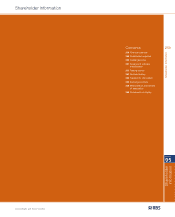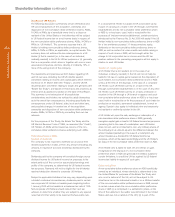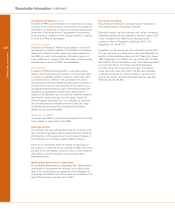RBS 2005 Annual Report Download - page 266
Download and view the complete annual report
Please find page 266 of the 2005 RBS annual report below. You can navigate through the pages in the report by either clicking on the pages listed below, or by using the keyword search tool below to find specific information within the annual report.
264
Shareholder information
Shareholder information continued
Taxation for US Holders
The following discussion summarises certain US federal and
UK tax consequences of the acquisition, ownership and
disposition of non-cumulative dollar preference shares, ADSs,
X-CAPs or PROs by a beneficial owner that is a citizen or
resident of the United States or that otherwise will be subject
to US federal income tax on a net income basis in respect of
the non-cumulative dollar preference shares, ADSs, X-CAPs or
PROs (a “US Holder”). This summary assumes that a US
Holder is holding non-cumulative dollar preference shares,
ADSs, X-CAPs or PROs, as applicable, as capital assets. This
summary does not address the tax consequences to a US
Holder (i) that is resident (or, in the case of an individual,
ordinarily resident) in the UK for UK tax purposes or (ii) generally,
that is a corporation which alone or together with one or more
associated companies, controls, directly or indirectly, 10% or
more of the voting stock of the company.
The statements and practices set forth below regarding US
and UK tax laws, including the US/UK double taxation
convention relating to income and capital gains which entered
into force on 31 March 2003 (the “Treaty”), and the US/UK
double taxation convention relating to estate and gift taxes (the
“Estate Tax Treaty”), are based on those laws and practices as
in force and as applied in practice on the date of this Report.
This summary is not exhaustive of all possible tax
considerations and holders are advised to satisfy themselves
as to the overall tax consequences, including specifically the
consequences under US federal, state, local and other laws,
and possible changes in taxation law, of the acquisition,
ownership and disposition of non-cumulative dollar preference
shares, ADSs, X-CAPs or PROs by consulting their own tax
advisers.
For the purposes of the Treaty, the Estate Tax Treaty and the
US Internal Revenue Code of 1986, as amended (the “Code”),
US Holders of ADSs will be treated as owners of the non-
cumulative dollar preference shares underlying such ADSs.
Preference shares or ADSs
Taxation of dividends
The company is not required to withhold tax at source from
dividend payments it makes or from any amount (including any
amounts in respect of accrued dividends) distributed by the
company.
Dividends paid by the company will constitute foreign source
dividend income for US federal income tax purposes to the
extent paid out of the current or accumulated earnings and
profits of the company, as determined for US federal income
tax purposes. Payments will not be eligible for the dividends-
received deduction allowed to corporate US Holders.
Subject to applicable limitations that may vary depending upon
a holder’s individual circumstances, dividends paid to certain
non-corporate US Holders in taxable years beginning before
1 January 2009 will be taxable at a maximum tax rate of 15%.
Non-corporate US Holders should consult their own tax
advisers to determine whether they are subject to any special
rules that limit their ability to be taxed at this favourable rate.
If a corporate US Holder is subject to UK corporation tax by
reason of carrying on a trade in the UK through a permanent
establishment and its non-cumulative dollar preference share
or ADS is, or has been, used, held or acquired for the
purposes of that permanent establishment, certain provisions
introduced by the Finance (No. 2) Act 2005 will apply if the US
Holder holds its non-cumulative dollar preference share or ADS
for a “tax avoidance purpose”. If these provisions apply,
dividends on the non-cumulative dollar preference share or
ADS, as well as certain fair value credits and debits arising in
respect of such share or ADS, will be brought within the
charge to UK corporation tax on income and the UK tax
position outlined in the preceding paragraphs will not apply in
relation to such US Holder.
Taxation of capital gains
A US Holder that is not resident (or, in the case of an
individual, ordinarily resident) in the UK will not normally be
liable for UK tax on capital gains realised on the disposition of
such holder’s non-cumulative dollar preference share or ADS
unless at the time of the disposal, in the case of a corporate
US Holder, such US Holder carries on a trade in the UK
through a permanent establishment or, in the case of any other
US Holder, such US Holder carries on a trade, profession or
vocation in the UK through a UK branch or agency and such
non-cumulative dollar preference share or ADS is or has been
used, held or acquired by or for the purposes of such trade (or
profession or vocation), permanent establishment, branch or
agency. Special rules apply to individuals who are temporarily
not resident or ordinarily resident in the UK.
A US Holder will, upon the sale, exchange or redemption of a
non-cumulative dollar preference share or ADS, generally
recognise capital gain or loss for US federal income tax purposes
(assuming that in the case of a redemption, such US Holder
does not own, and is not deemed to own, any ordinary shares of
the company) in an amount equal to the difference between the
amount realised (excluding in the case of a redemption any
amount treated as a dividend for US federal income tax
purposes, which will be taxed accordingly) and the US Holder’s
tax basis in the non-cumulative dollar preference share or ADS.
A US Holder who is liable for both UK and US tax on gain
recognised on the disposal of a non-cumulative dollar
preference share or ADS will generally be entitled, subject to
certain limitations, to credit the UK tax against its US federal
income tax liability in respect of such gain.
Estate and gift tax
A non-cumulative dollar preference share or ADS beneficially
owned by an individual, whose domicile is determined to be
the United States for purposes of the Estate Tax Treaty and
who is not a national of the UK, will not be subject to UK
inheritance tax on the individual’s death or on a lifetime transfer
of the non-cumulative dollar preference share or ADS, except
in certain cases where the non-cumulative dollar preference
share or ADS (i) is comprised in a settlement (unless, at the
time of the settlement, the settlor was domiciled in the United
States and was not a national of the UK); (ii) is part of the




















